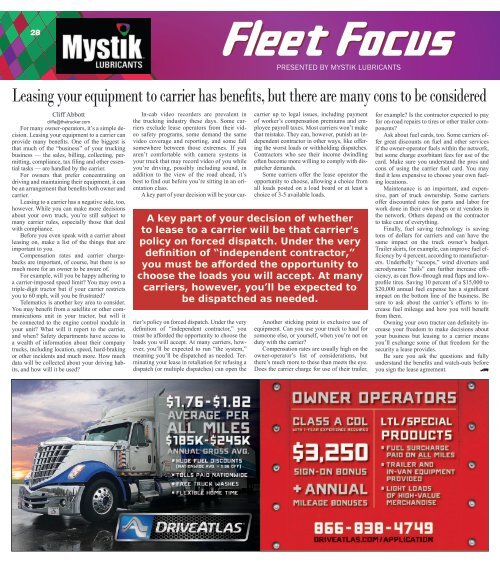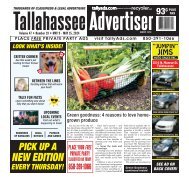The Trucker Newspaper - November 15, 2018
You also want an ePaper? Increase the reach of your titles
YUMPU automatically turns print PDFs into web optimized ePapers that Google loves.
28<br />
Cliff Abbott<br />
cliffa@thetrucker.com<br />
For many owner-operators, it’s a simple decision.<br />
Leasing your equipment to a carrier can<br />
provide many benefits. One of the biggest is<br />
that much of the “business” of your trucking<br />
business — the sales, billing, collecting, permitting,<br />
compliance, tax filing and other essential<br />
tasks — are handled by the carrier.<br />
For owners that prefer concentrating on<br />
driving and maintaining their equipment, it can<br />
be an arrangement that benefits both owner and<br />
carrier.<br />
Leasing to a carrier has a negative side, too,<br />
however. While you can make more decisions<br />
about your own truck, you’re still subject to<br />
many carrier rules, especially those that deal<br />
with compliance.<br />
Before you even speak with a carrier about<br />
leasing on, make a list of the things that are<br />
important to you.<br />
Compensation rates and carrier chargebacks<br />
are important, of course, but there is so<br />
much more for an owner to be aware of.<br />
For example, will you be happy adhering to<br />
a carrier-imposed speed limit? You may own a<br />
triple-digit tractor but if your carrier restricts<br />
you to 60 mph, will you be frustrated?<br />
Telematics is another key area to consider.<br />
You may benefit from a satellite or other communications<br />
unit in your tractor, but will it<br />
be connected to the engine control module in<br />
your unit? What will it report to the carrier,<br />
and when? Safety departments have access to<br />
a wealth of information about their company<br />
trucks, including location, speed, hard-braking<br />
or other incidents and much more. How much<br />
data will be collected about your driving habits,<br />
and how will it be used?<br />
In-cab video recorders are prevalent in<br />
the trucking industry these days. Some carriers<br />
exclude lease operators from their video<br />
safety programs, some demand the same<br />
video coverage and reporting, and some fall<br />
somewhere between those extremes. If you<br />
aren’t comfortable with camera systems in<br />
your truck that may record video of you while<br />
you’re driving, possibly including sound, in<br />
addition to the view of the road ahead, it’s<br />
best to find out before you’re sitting in an orientation<br />
class.<br />
A key part of your decision will be your carrier’s<br />
policy on forced dispatch. Under the very<br />
definition of “independent contractor,” you<br />
must be afforded the opportunity to choose the<br />
loads you will accept. At many carriers, however,<br />
you’ll be expected to run “the system,”<br />
meaning you’ll be dispatched as needed. Terminating<br />
your lease in retaliation for refusing a<br />
dispatch (or multiple dispatches) can open the<br />
PRESENTED BY MYSTIK LUBRICANTS<br />
Leasing your equipment to carrier has benefits, but there are many cons to be considered<br />
carrier up to legal issues, including payment<br />
of worker’s compensation premiums and employee<br />
payroll taxes. Most carriers won’t make<br />
that mistake. <strong>The</strong>y can, however, punish an independent<br />
contractor in other ways, like offering<br />
the worst loads or withholding dispatches.<br />
Contractors who see their income dwindling<br />
often become more willing to comply with dispatcher<br />
demands.<br />
Some carriers offer the lease operator the<br />
opportunity to choose, allowing a choice from<br />
all loads posted on a load board or at least a<br />
choice of 3-5 available loads.<br />
A key part of your decision of whether<br />
to lease to a carrier will be that carrier’s<br />
policy on forced dispatch. Under the very<br />
definition of “independent contractor,”<br />
you must be afforded the opportunity to<br />
choose the loads you will accept. At many<br />
carriers, however, you’ll be expected to<br />
be dispatched as needed.<br />
Another sticking point is exclusive use of<br />
equipment. Can you use your truck to haul for<br />
someone else, or yourself, when you’re not on<br />
duty with the carrier?<br />
Compensation rates are usually high on the<br />
owner-operator’s list of considerations, but<br />
there’s much more to these than meets the eye.<br />
Does the carrier charge for use of their trailer,<br />
for example? Is the contractor expected to pay<br />
for on-road repairs to tires or other trailer components?<br />
Ask about fuel cards, too. Some carriers offer<br />
great discounts on fuel and other services<br />
if the owner-operator fuels within the network,<br />
but some charge exorbitant fees for use of the<br />
card. Make sure you understand the pros and<br />
cons of using the carrier fuel card. You may<br />
find it less expensive to choose your own fueling<br />
locations.<br />
Maintenance is an important, and expensive,<br />
part of truck ownership. Some carriers<br />
offer discounted rates for parts and labor for<br />
work done in their own shops or at vendors in<br />
the network. Others depend on the contractor<br />
to take care of everything.<br />
Finally, fuel saving technology is saving<br />
tons of dollars for carriers and can have the<br />
same impact on the truck owner’s budget.<br />
Trailer skirts, for example, can improve fuel efficiency<br />
by 4 percent, according to manufacturers.<br />
Underbelly “scoops,” wind diverters and<br />
aerodynamic “tails” can further increase efficiency,<br />
as can flow-through mud flaps and lowprofile<br />
tires. Saving 10 percent of a $<strong>15</strong>,000 to<br />
$20,000 annual fuel expense has a significant<br />
impact on the bottom line of the business. Be<br />
sure to ask about the carrier’s efforts to increase<br />
fuel mileage and how you will benefit<br />
from them.<br />
Owning your own tractor can definitely increase<br />
your freedom to make decisions about<br />
your business but leasing to a carrier means<br />
you’ll exchange some of that freedom for the<br />
security a lease provides.<br />
Be sure you ask the questions and fully<br />
understand the benefits and watch-outs before<br />
you sign the lease agreement. 8

















